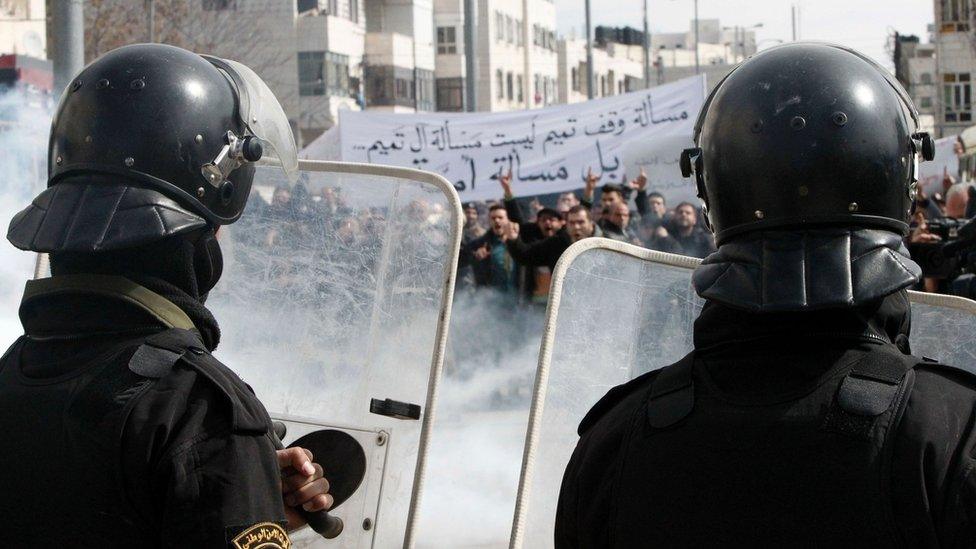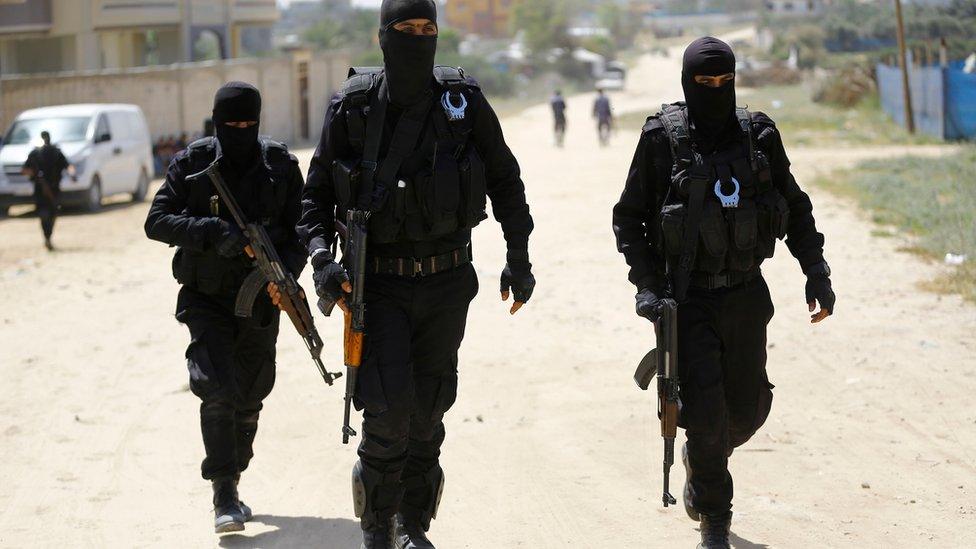Palestinian forces routinely arresting and torturing critics - HRW
- Published

The Palestinian Authority said its security forces were committed to upholding the law
The Fatah-led Palestinian Authority in the occupied West Bank and Hamas authorities in the Gaza Strip routinely arrest and torture peaceful critics and opponents, Human Rights Watch says.
A report based on interviews with former detainees alleges the rival factions have "established machineries of repression to crush dissent".
Security forces, it says, often taunt, threaten, beat, and put detainees in painful stress positions.
The PA and Hamas deny the allegations.
The PA was set up as an interim administration for the major Palestinian cities in the West Bank and Gaza 25 years ago as a result of the peace accords with Israel.
It continues to manage Palestinian affairs in parts of the West Bank. But forces loyal to President Mahmoud Abbas and Fatah lost control of Gaza to Hamas in 2007 - a year after the militant Islamist group won the last legislative elections.
The 149-page report published by HRW on Tuesday was based on interviews with 147 witnesses, external, including ex-detainees and their relatives, and reviewed photographic and video evidence, medical reports and court documents.
It says that in recent years both PA and Hamas security forces have carried out scores of arbitrary arrests for peaceful criticism, particularly on social media, among independent journalists, on university campuses, and at demonstrations.
As the Fatah-Hamas feud deepened despite attempts at reconciliation, PA security services have targeted supporters of Hamas and vice-versa, it adds.
"Palestinian authorities often rely on overly broad laws that criminalize insulting 'higher authorities', creating 'sectarian strife', or 'harming the revolutionary unity' to detain dissidents for days or weeks, only to release most of them without referring them to trial, but often leaving charges outstanding," the report says.

Hamas said its security forces had taken action against officers who violated the law
Alaa Zaqeq was detained by PA security forces in the West Bank in April 2017 for three weeks based on his activism with a student group affiliated with Hamas.
He said officers at a prison handcuffed him behind his back, and then tied a piece of cloth to the handcuffs that ran through a hook above a door.
"They pulled the cloth up, raising my hands behind my back. My legs were not shackled, and the tips of my legs were touching the ground. I was held in this stress position for 45 minutes," he told HRW.
"An officer hit me with a big stick on my back, between my shoulders, more than once... After they put me down, I felt my hands were numb up to my shoulders and I could not hold myself up."
Fouad Jarada, a journalist with the Palestinian Broadcasting Corporation, was arrested by Hamas forces in Gaza in June 2017 and held for two months after writing a Facebook post critical of a Hamas ally and critical news reports.
"I was forced to stand blindfolded the entire day in a room called the bus. There were 5 or 10 people with me. On occasion they sat us down in small chairs, but we needed permission for everything we did, including sleeping or speaking," he said.
"I spent 30 days there... After the first day, the beating started, they asked me to open my hands and started striking me with a cable and whipping my feet."
HRW called on the European Union, the United States and other governments that financially support the PA or Hamas should suspend aid to the specific units or agencies implicated in the report until those responsible for alleged abuses were held accountable.
It warned that the systematic practice of torture might amount to a crime against humanity prosecutable by the International Criminal Court (ICC), whose prosecutor is deciding whether to open a formal probe into Israeli and Palestinian conduct in the Palestinian territories.
Officials in the West Bank and Gaza rejected the findings.
Maj Gen Adnan al-Dmairi, a spokesman for the PA's security forces, told Reuters news agency: "Arrests are being carried according to the law and we are committed to upholding the law."
Eyad al-Bozom, spokesman of the Hamas-run ministry of interior in Gaza, said: "We do not have a policy of torture. This is a violation of the law."
"We have taken action against officers who violated the law, including issues of torture. Some were detained and put on trial, others were demoted," he added.